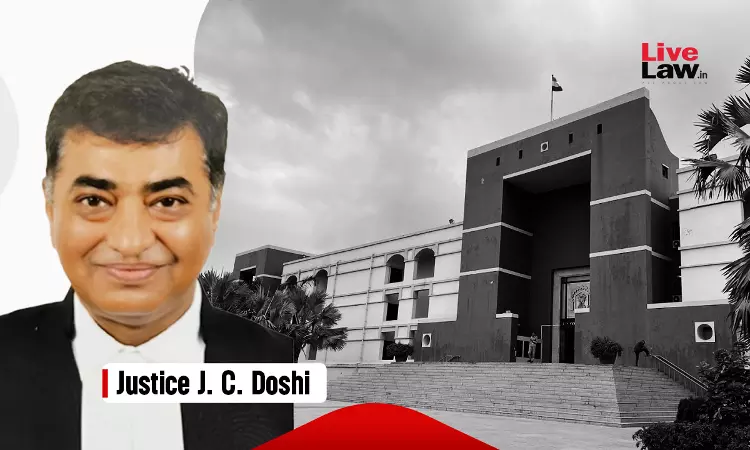- Home
- /
- High Courts
- /
- Gujarat High Court
- /
- Gujarat High Court Refuses To Quash...
Gujarat High Court Refuses To Quash Corruption Charges Against Former SEZ Officers Booked For Favouring Illegal Metal-Scrap Import
LIVELAW NEWS NETWORK
24 Oct 2025 12:00 PM IST
The Gujarat High Court refused to quash forgery, cheating and corruption charges against two former Kandla Special Economic Zone (KASEZ) officials accused of filing a false inspection report in respect of an entity importing metal scrap by allegedly fraudulently diverting duty-free imported materials into open market. A Letter of Permission (LOP) dated 24.01.2002 was issued by...
The Gujarat High Court refused to quash forgery, cheating and corruption charges against two former Kandla Special Economic Zone (KASEZ) officials accused of filing a false inspection report in respect of an entity importing metal scrap by allegedly fraudulently diverting duty-free imported materials into open market.
A Letter of Permission (LOP) dated 24.01.2002 was issued by Development Commissioner of KASEZ, in favour of one Anis Abu Mithani the proprietor of M/s. Shiv Metal Corporation, authorizing duty-free import of metal scrap for export-oriented manufacture. The petitioners–C.S. Srinivas and H.C. Pandya were public servants working as Officers on Special Duty (OSD) on deputation in the office of the Development Commissioner, KASEZ Ahmedabad in 2002.
Subsequently, allegations surfaced that the said unit had fraudulently diverted duty-free imported materials into the open market and fabricated export documents, thereby causing revenue loss to the Government.
Though the petitioners were not named in the FIR registered by the CBI on 24.06.2004, they were later implicated in the charge sheet primarily on the basis of a joint inspection report dated 17.07.2002 submitted by them to the Development Commissioner pursuant to official directions dated 02.07.2002.
The petitioners were arraigned as accused in the case pending before the CBI court Ahmedabad. The charge sheet filed by the CBI sought to prosecute them under IPC Sections 120B(criminal conspiracy), 420(cheating), 467(forgery of valuable security, will, etc), and 471(Using as genuine a forged document or electronic record) and Section 13(2) read with Section 13(1)(d) of the Prevention of Corruption Act.
Justice JC Doshi observed that the petitioners had moved applications under Section 227 CrPC seeking discharge, which were dismissed by the trial court. The dismissal was assailed by the petitioners by filing Criminal Revision Application under Sections 397 and 401 Cr.P.C.
The court noted that the CBI had raised a preliminary objection as to the maintainability of the revision plea. Perceivably realizing the legal impediment, the petitioners then sought leave to convert the Criminal Revision Application into a Special Criminal Application invoking writ jurisdiction under Article 226 of the Constitution of India.
The court then said:
"This sequence of events unmistakably demonstrates that the petitioners were fully conscious of the express bar contained in Section 19(3)(c) of the Prevention of Corruption Act, 1988, which precludes the grant of stay of proceedings or entertainment of revision against interlocutory orders. Ergo, it is manifest that what could not have been achieved under Sections 397 and 401 Cr.P.C., cannot be permitted to be attained sub silentio through the writ jurisdiction of this Court under Article 226 of the Constitution".
The court referred to Supreme Court's decision in Satya Narayan Sharma v. State of Rajasthan (2001) where it was held that High Courts ought not to exercise inherent powers under Section 482 Cr.P.C. or writ jurisdiction under Articles 226 or 227 to stay or interdict proceedings pending before the Special Court constituted under the Act.
"Thus, in view of the authoritative pronouncements of the Apex Court, it stands well-settled that the embargo contained in. Section 19(3)(c) of the Prevention of Corruption Act, 1988 does not operate as an absolute interdiction upon the exercise of inherent jurisdiction by the High Court under Section 482 of the Cr.P.C.," the court added.
The petitioners filed discharge applications before trial court contending that their report was merely a compliance of official instructions and contained no element of falsity or criminal intent. The CBI, however, opposed the applications with allegations unsupported by the charge sheet. The trial court in its order dated 06.05.2013, rejected the discharge applications. Against this the petitioners moved the high court for quashing the trial court order and the charges framed against them.
On the contention that the petitioners had been discharged in departmental proceedings the court said, "The petition, when read as a whole, is confined to assailing the order of the learned CBI Court rejecting the discharge application, and does not traverse any other substantive grounds warranting interference under Article 226. Ergo, the argument advanced by learned Senior Advocate on the ground of departmental exoneration is wholly devoid of legal substratum and cannot be countenanced. It is a well-settled principle of law that a ground which is not canvassed in the pleadings cannot be permitted to be urged across the bar".
The plea was dismissed.
Case title: CHIRALA SESHA SRINIVAS, INSPECTOR OF CETRAL EXCISE, & ANR. v/s STATE OF GUJARAT & ANR.
R/SPECIAL CRIMINAL APPLICATION (QUASHING) NO. 5364 of 2014
Click Here To Read/Download Order



